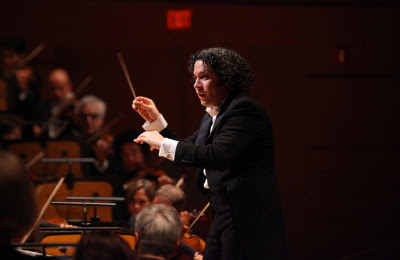Defying all odds, Disney Hall celebrated its 10th anniversary without so much as one official standing on stage to bestow thanks to long lists of benefactors or indulge in blandishments and platitudes.
Yes, Gustavo Dudamel fronted his LA Philharmonic and welcomed the capacity crowd to Disney. “A miracle,” he called it, that single word summing up the concert venue’s brilliant acoustic and architectural wonder.
But this was no ordinary birthday gala. It was wholly a tribute event to Frank Gehry, the man who patiently took his lumps over the years, yet managed -- through controversy, dispute and economic sputtering -- to create the citadel atop the hill at First and Grand that visitors from around the world flock to see.
The surprise factor turned out to be the architect’s persona in the hall -- via his voice heard on audio. What a homey and folksy voice it was, uttering the private words, almost comic and sometimes self-mocking à la Jules Feiffer, explaining how his designs came into being, how they doodled onto a page, only to get crossed out and tossed, over and over again before reaching a final draft.
And at evening’s end Gehry was brought onstage, in suit and tie, no fancy-dan tux -- even then without a trace of starchy pomp or self-importance, only a few humble, half-embarrassed bows but mostly gestures to the players and their maestro, amid a mylar confetti drop.
The main revelry, though, came with the music, a smartly programmed hour that showed off the orchestra in sterling form. True, there were intrusive screens everywhere, a Hollywood Bowl leftover. (Even before entering the hall Gehry’s more philosophic quotes were projected onto walls of corridors and lobbies, portending something scarily ex-cathedra-like).
But if you were lucky enough to sit in a side section -- for this time only -- it was possible to look directly onto the stage and avoid seeing the screens. That way you could hear the music without the sensory distraction of unrelated visuals (a montage of other occasions, other conductors). And when that music is so compelling do you really want a non sequitur smack in your face?
No such disturbance entered the scene when Yo-Yo Ma, everyone’s favorite guest-star cellist these days, was on hand -- granting Tchaikovsky’s Variations on a Rococo Theme his utter refinement, elegance and poise in gorgeous balance with the band, expertly managed by its chief.
In fact, the orchestra played everything superbly, back again in its rightful residence. And that included Adès’s “These Premises Are Alarmed,” a gloriously wild thing that lives up to its title and generated the players’ bracing, clarion excitement.
Dudamel also took a bracing tack with the Rondo Burleske from Mahler’s 9th Symphony -- which he powered in with ultra-fast fury. His way with the organ movement of Saint-Saëns’s 3rd Symphony required some ear-stuffing, for those protecting their hearing, but he and his cohorts ended on a sentimental note, with a tenderly lush, glittering “When You Wish Upon a Star,” honoring the Hollywood icon and the hall’s namesake, pictured onscreen.
Across the street at the Music Center Pavilion honors also came to LA Opera, by way of Bizet’s “Carmen” -- with the same production it borrowed from Madrid and mounted here twice before. But this time, thanks to Trevore Ross directing a wholly alive cast, every moment on stage counted. And with Plácido Domingo’s masterly guidance of the pit orchestra, issuing the score’s delicious sweetness and ardor, all kinds of narrative business also became illuminated.
Carmen, for instance, left alone in the smuggler’s camp to brood over her distressful love triangle, brought the third act to a climactic close, angrily flicking her cigarette in a cadential flourish with the last bold chord.
Otherwise, Irish mezzo soprano Patricia Bardon -- vocally sound if not lustrous -- made only a somewhat convincing Gypsy hellion in the title role and was more of a tough cookie than a sensual dynamo.
But Brandon Jovanovich, with a gradual warm-up to the naïve soldier’s ultimately obsessional, manic despair, gave a performance worthy of an Oscar. It was his and the defiant Carmen’s own human bull fight -- she, testing the limits of life and love; he, determined to possess her -- that took place outside the arena. With each rigid, tense step he stalked her as in a dance of death. His murderous finale was more gripping than that of any Don José I’ve ever seen -- a rarity in opera because singing, by itself, takes utmost focus. And his darkly resonant tenor did not disappoint.
Other cast members kept up the high standard. Ildebrando D’Arcangelo was a wonderfully animated and agile Escamillo, not the stolid mannequin usually trotted out to sing the “Toreador Song.” (Both he and Jovanovich sang for the company before in productions that had, seemingly, absentee directors. Redemption at last, on a grand scale...)
First timers in this “Carmen” were South African soprano Pretty Yende, a Micaëla of silvery tone and gratifyingly natural demeanor as the Madonna interest, and Valentin Anikin, a corrupt Zuniga whose basso sounded as though it got swallowed in a cavern.
But the whole enterprise was absorbing. Set designer Gerardo Trotti’s sun-drenched first act boasted a lovely, long perspective of a palm-tree-lined Seville street, and men in Jesús del Pozo’s summery pastels wearing borsalinos and berets.
Granted, there was no gritty realism here, no graffiti-scrawlings on walls as depicted in Jean-Pierre Ponnelle’s landmark production, nor any attempt at a Peter Brooks deconstruction. But Bizet in his own Opéra Comique style, carried out with this degree of attention, is irrefutably captivating.


